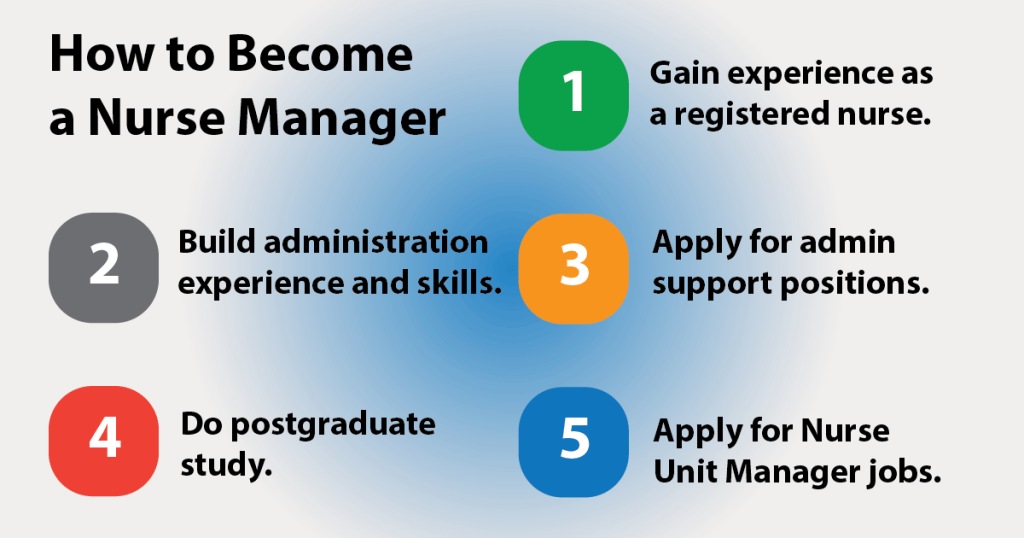Explore what nurse managers do in Australia and how you can secure this sought-after role.

Overview
A Nurse Unit Manager is an experienced registered nurse who manages a nursing team. They can be found in hospitals, aged care facilities, clinics, and other settings where nursing care is provided.
Nurse Unit Managers supervise staff within the nursing unit and carry out administrative duties such as rostering, budgeting, managing equipment, supplies, catering, and cleaning, as well as ensuring compliance with healthcare standards. They also liaise with administrators and medical professionals to deliver well-coordinated, high-quality nursing care.
To become a nurse manager, significant experience as a nurse is required, along with demonstrated skills in communication, management, and administration. Postgraduate qualifications are almost essential, ideally including business and leadership training.
What Does a Nurse Unit Manager Do?
A Nurse Unit Manager (NUM), or Nurse Ward Manager (NWM), manages a nursing team. Every team of nurses needs someone to lead and organise them. That's what the NUM does. They are responsible for supervising staff, overseeing patient care, managing operations and budgets, and coordinating with administrators, medical specialists and other nurse unit managers.
Table 1. How role is described across Australia
| State/Territory | Title | Role |
|---|---|---|
| New South Wales | Nursing Unit Manager | Oversees ward/unit, care coordination, staff management. |
| Victoria | Nurse Unit Manager | Manages ward/unit, clinical and administrative oversight. |
| Queensland | Nurse Unit Manager | Operational management, staff supervision, care quality. |
| Western Australia | Senior Registered Nurse | Leadership, policy implementation, resource management. |
| South Australia | Nurse Unit Manager | Direct patient care, health system support, team leadership. |
| Tasmania | Nurse Manager | Manages resources within nursing unit. |
| ACT | Nurse Manager | Work unit leadership, operational planning, service delivery. |
| Northern Territory | Nurse Specialist (Management) | Contribute to management of resources, coordinate client care. |
Sources: Public sector nurse/midwife enterprise agreements or classification structures for each state and territory.
A Nurse Unit Manager (NUM) or equivalent classification is responsible for managing a nursing team, with a strong emphasis on resource management, including staff. While a NUM contributes to education and clinical practice, they may receive strong support in these areas from a Clinical Nurse Educator and Clinical Nurse Consultant.
Job duties
Every nurse manager has a broad range of tasks to take care and a multitude of objectives. Based on the different accounts by state, eight essential job duties are:
- Leadership and team supervision. Direct and supervise the nursing staff.
- Operational management. Manage day-to-day operations in the ward.
- Policy implementation. Ensure adherence to healthcare policies and standards.
- Budget and resource management. Oversee budget, resources, and staffing.
- Quality assurance. Monitor patient care and maintain care standards.
- Interdisciplinary collaboration. Coordinate with other healthcare professionals.
- Strategic planning and improvement. Contribute to long-term unit improvements.
- Staff recruitment. Manage the recruitment and staffing process.
Job goals and daily objectives
The goal of nursing managers is to build and maintain a successful team of nurses. Within the limits of budgets, regulations and policies, they aim to achieve a high-functioning team with good morale, excellent measurable outcomes, and high standards for patient care.
Managers are also accountable for practical matters on a daily basis. For example, they need to ensure equipment and supplies are in order, enough qualifiied staff are in attendance, the environment is clean and safe, and patients are receiving appropriate care. As such, the job demands that you meet immediate operational requirements, while also planning and strategising for the future.
How to Become a Nurse Manager
Becoming a nurse manager involves gaining well-rounded experience as a nurse and then developing and demonstrating the skills needed to move into management. Establish yourself as a capable and knowledgeable nurse leader, then prepare and look for opportunities to formally manage.
Here are the 5 steps involved:
- Gain experience as a registered nurse. Work as a registered nurse to acquire clinical experience and understand healthcare operations. Rotating roles will broaden your knowledge.
- Build administration experience and skills. Develop skills in administration and management. Aim for at least three years of experience, as required in South Australia.
- Apply for admin support positions. Seek roles such as Associate Nurse Unit Manager (ANUM) to gain relevant administrative and leadership experience. You may step in to act as a NUM when the regular manager is absent.
- Do postgraduate study. Enhance your qualifications with further education, like a Master of Nursing (Management). In South Australia, you need postgraduate qualifications, or be in the process of acquiring them, to be eligible for NUM jobs. Advance and broaden your skills, focusing on business administration.
- Apply for Nurse Unit Manager jobs. With your clinical experience, administrative skills, and advanced education, apply for NUM positions. A strong combination of experience, qualifications, and job references will make you highly competitive.
Becoming an Associate Nurse Unit Manager (ANUM) is a common stepping stone to NUM positions in Australia. The process to qualify for this role is similar. Establish yourself as a nurse by trying different roles, develop administration skills, complete postgraduate study, and apply for associate or other management positions just below the NUM level.
Regarding postgraduate courses, a Graduate Certificate in Nursing Leadership and Management is an excellent starting point. Completed subjects can usually be credited towards a Graduate Diploma in Nursing or a Master of Nursing degree. In addition, graduates are normally entitled to an ongoing qualification allowance, which adds to their take-home pay.
Related: Postgraduate Nursing Courses Online
Skills Required
Nurse unit managers need clinical skills to oversee nursing care, with the healthcare knowledge and reasoning ability to make sound decisions. But they also require leadership abilities to communicate with and motivate others. Practical organisation skills are essential to complete tasks such as deploying staff and allocating funds.
Healthcare skills
- Clinical decision-making.
Make informed choices about patient care. - Quality assurance.
Maintain high care standards and regulatory compliance. - Patient care coordination.
Oversee quality patient care services. - Health and safety compliance.
Maintain a safe patient and staff environment. - Resource allocation.
Distribute equipment and supplies effectively.
Administration skills
- Financial management.
Manage the unit's budget and resources. - Rostering.
Schedule staff efficiently for adequate coverage. - Data analysis.
Use data for decision-making and care improvement. - Recruitment and hiring.
Select and recruit nursing staff. - Policy implementation.
Apply healthcare policies in nursing units.
- Regulatory compliance.
Adhere to healthcare laws and standards. - Contract and vendor management.
Manage agreements with external suppliers.
Leadership skills
- Staff supervision.
Oversee nursing staff and their daily activities. - Performance evaluation.
Assess and provide feedback on staff performance. - Conflict resolution.
Resolve workplace conflicts. - Strategic planning.
Plan long-term for the unit's operations and growth. - Team building.
Foster a cohesive working environment. - Communication skills.
Communicate effectively with staff, patients, and others. - Staff training and professional development.
Facilitate education and growth for nurses. - Stakeholder engagement.
Collaborate with other departments and external entities.
Related: Nursing Certification Courses Online


